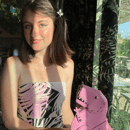Chandler writes a lot. Mostly on her computer, where she types emotionally detached, academic things. Her fingers dart across her keyboard, quick and aggressive, I watch from across the room as she records theories and refines her thoughts into polished, palatable words. Sometimes she grows tired of this kind of writing. In those moments, she closes her laptop, places me on her lap, and taps into another world, one that exists outside the realm of theories. This world is more raw. More vulnerable. Less coherent. She transforms into the version of her I know best, lacing together words and sound, majors and minors, touching me tenderly. In this world, she does not analyze emotions. She feels them.
There are many aspects of Chandler’s life that I will never understand, and I prefer it that way. I do not envy her computer and am glad for it to possess her rationality. Perhaps I am less portable, less used, but I am also more loved, trusted with her most intimate thoughts. Her father died and we grieved together: I see your ghost in a picture frame, so I kiss the glass, and I wear your name. She fell in love and confided in me before anyone else: You walked in a snow globe turning, glinting light and magic things. I sense her heart reflected in these lyrics, its strings interwoven with mine. We connect only through these lyrical fragments, but I am content, knowing that they represent the best parts of her.
I treasure these moments, and yet I cannot help but mourn her absences. As she grows older, I see Chandler less and less – her fingers feel softer now, less calloused. I presume that other commitments occupy more and more of her time. I spend most of my days alone in an empty bedroom, my three-year-old bronze strings rusting, my ebony body scratched from carelessness. When we sing together, it’s almost always in thirty-minute spurts, pockets of time squeezed into her bustling days. At least, I imagine them to be bustling. I really have no way of knowing. She leaves and I become the observer, subscribing to logic and analysis. I survey her room: the posters, the trinkets, the dying flowers. Weeping rot, they fear the afterlife. I select a new object to analyze and forget their pain.
Sometimes, when the weather is just right, and when she has just enough time, Chandler carries me to her porch. We sit on a fraying blanket and compose together, her humming, me echoing, both of our voices waltzing with the wind. Our porch sessions are transformative, healing. We remind each other to feel past logic and seek comfort in half-formed words.


